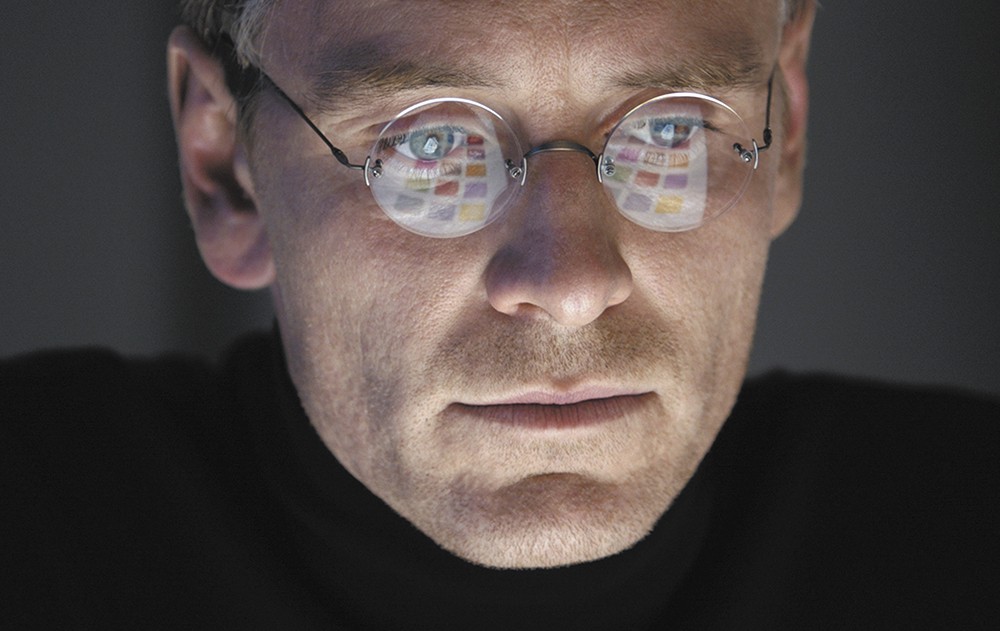Even the most ardent Bill Gates fanatic or Android fanboy, deep down in some dark little corner of their hearts, must admit that Steve Jobs changed the culture in a profound way. He promoted the idea of technology as something friendly and approachable and, yes, touchable. He sold simplicity by controlling every aspect of the user experience, refuting specialized hacker culture in favor of a mass-market experience. And he introduced the idea of personality to the field of personal computing. It's his fault that every damn tech company holds an adjective-stuffed keynote to announce the newest iteration of its array of devices, even though no other CEO can claim the raw charisma and blatant hucksterism of Jobs.
Steve Jobs touches on all these aspects of Jobs' legacy. Framed as three distinct scenes, it follows Jobs in the minutes before three major product launches: the Macintosh announcement in 1984 that led to his firing from Apple; the introduction of Jobs's first and only post-Apple project, the NeXT Computer, in 1988; and his triumphant return to Apple with the announcement of the first iMac.
Aaron Sorkin's script keeps the story short and limited in scope and propulsion, a mix of his walking-and-talking West Wing sequences, his technological commentary from The Social Network and a little bit of bloviating from The Newsroom. It never quite feels as sharply focused and essential as some of Sorkin's best work — the film seems overly interested in a redemptive arc that it doesn't fully earn, and all the enthusiastic chatter about Apple products lend an unfortunate air of product placement.
It's quite possible that Steve Jobs would work better as a stage play than it does as a film, focused as it is on the smaller moments before the bombast of Jobs's onstage announcements. The dense, clever, rewarding script would likely pack even more meaning into a room full of a few dozen people focused intently on the facial expressions of a handful of actors. Jobs is such a colossal asshole that the intimacy of the stage would add a tension to the script that film simply couldn't supply.
Which is not to say the actors don't acquit themselves well. Michael Fassbender is excellent at Jobs — he evokes the man's character without resorting to caricature or emulation. Jeff Daniels, fresh off his witty turn as the head of NASA in The Martian, plays John Sculley, the former Pepsi CEO who Jobs recruited. Even though he eventually betrays Jobs, one might be forgiven for identifying Sculley as the conscience of the film, except pretty much every character besides Jobs is a conscience of the film: Seth Rogen is all rumpled Muppet-y dignity as Apple co-creator Steve Wozniak. Kate Winslet is strangely subdued as Jobs' assistant Joanna Hoffman. Michael Stuhlbarg, the bit actor with a face you'd most definitely recognize, almost walks away with several scenes as Apple OS programmer Andy Hertzfeld.
But Steve Jobs is a highly uneven movie, and most of that blame falls on director Danny Boyle, who has the frustrating tendency to create scenes of fabulous tension, immediately followed by hammy moments of phony portentousness. Boyle makes some clunky decisions that betray the intelligence of the script. As Jobs talks about Skylab, for instance, the camera pulls back and images of the Skylab launch are superimposed over the scene; a climactic song choice weighs final scenes down with a thick sappiness. Of all the sins of film direction, Boyle falls victim to perhaps the most tragic biopic flaw: he's not enough of a genius to properly capture the genius of his subject. ♦

















